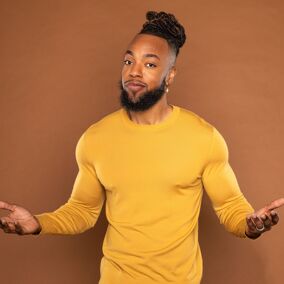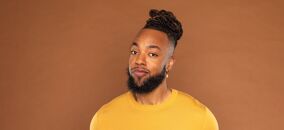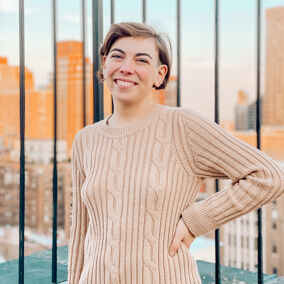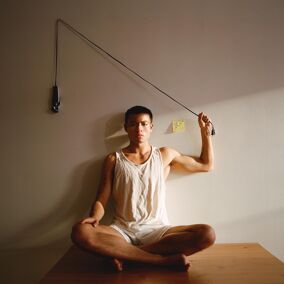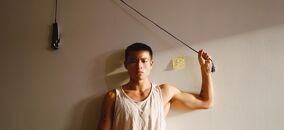
Studies show that LGBTQ people over-index for a range of mental health concerns, including depression. Stigma and prejudice can make life harder, and finding sensitive, culturally-appropriate care is sometimes a challenge. The pandemic, which forced many out of jobs and into isolation, only made things worse.
Fortunately, queer people are remarkably resilient, ready and eager to come together and lift one another up. A new campaign, Depression Looks Like Me, offers a safe space for individuals to share their lived experience and show one another they are not alone.
Queerty spoke to the talented Black Trans model, actor, and Diversity, Equality, and Inclusion trainer Devin-Norelle about battling depression, stigma, and how to get the most out of life.
Hey Devin-Norelle! Thanks for chatting with Queerty. First, what are your pronouns?
How about we take this to the next level?
Our newsletter is like a refreshing cocktail (or mocktail) of LGBTQ+ entertainment and pop culture, served up with a side of eye-candy.
My pronouns are ze/zim/zis.
What are you working on these days?
Where do I start? I’ve had lots of photoshoots, and many auditions. I’m working on mental health advocacy, sex-positive awareness, sharing histories of my favorite queer stomping grounds, and combating anti-trans measures. And of course, I’m always somewhere conducting gender-inclusive training for a large corporation or writing articles to dispel myths about trans people.
What are you reading, watching, and listening to lately?
I’ve been on the road on and off for almost two months, so it’s been hard to keep up with anything at the moment. I love watching documentaries and docu-series. At the moment, I’ve been enjoying The Principles of Pleasure, Pray Away, Disclosure, 13th, and The Last Forest.
For laughs, I watch Atlanta and Abbott Elementary. I don’t do much reading these days as my attention span is very short, but it helps to listen to audiobooks instead. A few great books on my plate are The New Jim Crow, Beyond the Gender Binary, Boys Aren’t Blue, I Don’t Want to Die Poor, Gender Outlaw, and Opening Up, a book about non-monogamous relationships.
What are your favorite places to hang out when you are in town?
I live in New York City, specifically Harlem, where I am a native. My neighborhood is actually a pretty great place to take a walk. There are always people to see and vendors to buy from, and plenty of art to admire. There’s a cafe I go to so that I don’t get stuck inside my apartment all day. I spend a lot of time at Central Park when it gets warmer. I love museums! My partner and I often go to the Brooklyn Museum or Museum of Modern Art. And when we are not indulging in art, we’re probably trying out a new restaurant as we both love food or a walk around Bed Stuy.
Where do you like to visit?

Traveling is my favorite hobby. I live for the beach! I wish we had better beaches in New York. But when it’s too cold here, I try to make at least one trip to a beachy area. I most recently returned from a two-week trip to Los Angeles and Lima, Peru. A few weeks before that, I was in Playa del Carmen and Mexico City. It was my second trip to Mexico City, but there is always so much to discover and plenty of food to eat. I hope to go to Europe after Pride.
Thank you for your courage in speaking out about difficult issues. Can you tell us a bit about your personal experience with depression?
Thank you! These two years or so may have been the most debilitating two years. I lost three family members to Covid. The first person I lost was one of my primary caretakers, my grandmother, back in March 2020. This past year, I realized I hadn’t grieved her death as the pandemic had begun to weigh down pretty heavily on me. The sorrow over her loss, and that of my other family members, compounded with the heaviness of the pandemic, hindered my ability to do almost anything.
How so?
It impacted my professional relationships, as well as my familial and romantic relationships. I felt unmotivated to work and was missing deadlines. Some days, I couldn’t get out of bed at all. I often didn’t sleep, especially as I continued to mourn my grandmother’s loss. I wasn’t hanging out with friends as much or ever. The other side of this is that I further frustrated myself because I couldn’t find the energy and motivation to do anything. This only worsened my depression.
As a member of the LGBTQ community, were there factors that impacted your depression?

Absolutely. It’s exhausting to see trans people being targeted all over various forms of media. Everywhere I looked and turned, another anti-trans bill had been introduced or passed, or another trans person had been murdered. Furthermore, I was often tasked with writing about these murders. This really sank me to an all-time low.
So sorry to hear that. It is a tough time to be a member of a minority group in this country. You are working to advocate for mental health in the Black community. How does intersectionality–Black, Trans, queer–play into the situation?
Generally speaking, it’s difficult for a Black person to find mental health resources. First, it’s heavily stigmatized in the Black community. I could probably be a millionaire if I had a dollar for each time a caretaker or Black elder told me that Black people don’t need therapy, that Black people are not crazy, can’t be depressed, or don’t have time to be depressed or that if I just thought more positively and prayed, the negative thoughts would go away. We internalized these things as children. It wasn’t until well into my early 20s that I realized my mental health issues weren’t something that could be reversed through positive thinking– I needed help. But because I was discouraged from seeking help, I had no clue where the hell to even begin looking.
How did you figure that out?
I didn’t know of a safe space available to me, that included people like me and spoke to my specific struggles with depression as a Black non-binary individual. Once I initially found information that could help me, what I discovered was that these services, which had been so heavily stigmatized, were also expensive and unaffordable with or without health insurance. And since mental health services for LGBTQIA+ are often considered specialized, finding affordable therapy for something like medically transitioning seemed out of reach.
What many people don’t realize is that LGBTQIA+ people are often houseless, do not have access to free health insurance, or do lack access to certain types of employment that can help pay for healthcare. Additionally, children who are listed on their parents’ insurance are at risk of outing themselves if they seek affirming doctors. And many states are now illegalizing trans-affirming care for trans youth who do have accepting parents. So where does the young Black trans masc or trans femme person go if they have been thrown out of their homes and off their parent’s health insurance for being queer? What if they are unable to find employment for being trans, and live in a southern or midwestern city that does not fund free healthcare?
How has being queer impacted the treatment of your depression? Obviously, stigma can make mental health issues more common and worse.
I think it has definitely made it more difficult for me to overcome my depression. I do have access to therapy, but sometimes just talking things out at therapy when trans people are being attacked left and right doesn’t always help to resolve the issue. Why? Because these things are still taking place, even after my sessions. If I’m in the wrong place at the wrong time, being outed can be very dangerous, even here in New York. It’s a tiring feeling to have to watch over my shoulder constantly, and all of these factors have made my depression more difficult to treat.
Did you struggle to find the treatment that is in the right context?
I find that often psychologists will gatekeep you if you don’t physically fit their idea of what depression or mental disabilities look like. It has been frustrating finding a psychologist because many have told me that since I am sometimes able to complete even the tiniest bit of work, then my depression must not be severe enough to be treated. I do think there’s a bit of anti-Blackness that plays into these dynamics, because I have had many non-Black friends with similar experiences to mine, and their doctors happily diagnose them or prescribe treatment.
One of the great things about LGBTQ life is the strength of our community and support groups. What role does that play in your life?
I can only attest to New York City, and maybe also Los Angeles, but the community-owned and community-led organizations are definitely the reasons I’m still alive. Access to Hormone Replacement Therapy (HRT) has saved my life. When I was suicidal, I could run to my local trans masc support group, and many of those members directed me to the medical help I needed. My community inspires me daily to continue living and fighting these uphill battles. Even when I am traveling, the community there is almost always helpful with free housing when I need it, and in helping to build connections for things like HRT if I forget my shot while traveling. My community is my rock and foundation. To find a safe space and find others can be a powerful thing, motivating one another to take one more step forward and not feel so alone. That is a lot of the reason why I’ve been so excited to see the conversation around depression come to the forefront, to see support tools and resources developed that are that are more tailored to the various and unique intersections of our diverse community.
Having been through this experience, what advice would you give someone who is experiencing depression?
Truthfully, this is a hard one, because depression does not look the same for any person. I think what kept me alive is therapy, but more importantly just seeking help and sharing my story with others. Adding my voice, feeling that sense of connectivity and finding my community. They understand that I might not always be present, but if I ask for help, there is always someone to either guide me in the right direction or find me the help that I need.
It’s difficult to ask for help when you are down and out, but reaching out to even just one person will make a difference.



